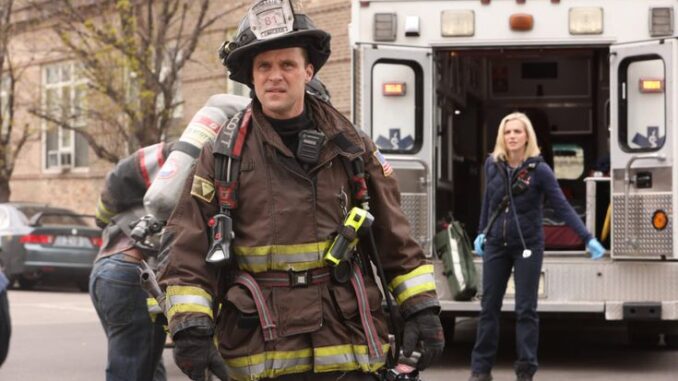
The hum of Engine 51’s lights on a crisp Chicago evening, the familiar banter in the common room, the steady rhythm of a firehouse that had seen decades of heroism and heartbreak – all had settled into a comfortable, almost predictable cadence by 2025. Fans, seasoned veterans of Chicago Fire, knew the beats: the dramatic rescue, the poignant loss, the unexpected romance. They thought they knew the show’s heart, its enduring spirit. But they were about to discover a depth of emotion they hadn’t felt in years, a collective gasp and a flood of tears that would redefine “shocking.”
It was a routine mid-season episode, or so it seemed. The A-plot centered on a particularly brutal high-rise fire, one that pushed Firehouse 51 to its absolute limits. Flames licked at the sky, concrete crumbled, and the airwaves crackled with the cacophony of sirens and desperate calls. Herrmann, older but no less steadfast, barked orders. Severide, a seasoned Lieutenant now, moved with a controlled fury, leading his squad into the inferno. Stella Kidd, Chief Boden’s protégé, was strategically deploying resources, her face grim with focus.
The scene cut to a critical moment: a collapse, trapping several civilians and some members of another responding house. The situation was dire, bordering on hopeless. Reinforcements were pouring in from all over the city, a desperate attempt to contain the chaos. Through the swirling smoke and the blinding glare of floodlights, a figure emerged from the periphery. He wasn’t with Engine 51, nor any of the visible CFD companies. His helmet was smoke-grimed, obscuring much of his face, but his movements were precise, authoritative. He wasn’t just a firefighter; he moved with the unwavering calm of a natural leader, assessing, directing, taking charge of a frantic rescue effort with a quiet efficiency that seemed almost… familiar.
Then, a sudden, brutal explosion rocked the building. Debris rained down. Amidst the chaos, a piece of scaffolding pinned a struggling firefighter. Panic flared. Before Severide could even fully process the new danger, the figure from the smoke, moving with an impossible speed, leveraged a heavy beam, shouting an order that cut through the pandemonium like a knife. He pushed the trapped firefighter clear just as the scaffolding buckled further. As he did, for a split second, his helmet shifted.
And there it was. Not just the outline of a jaw, but the resolute set of eyes, the firm line of a mouth, an expression that had commanded respect and love for over a decade. The name stenciled on his turnout coat, partially obscured by soot, now became painfully, impossibly clear: “CASEY.”
Across living rooms, apartments, and bars, a collective, visceral gasp rippled through the fandom. For a beat, the world stopped. Social media, usually a flurry of immediate reactions, went eerily silent, as if every viewer was holding their breath. Then, the dam burst.
“DID ANYONE ELSE JUST SEE THAT?!?!?!”
“NO. WAY. I’M HALLUCINATING.”
“IS THAT MATT CASEY??? OH MY GOD.”
“MY HEART JUST STOPPED. I’M SOBBING.”
“#ChicagoFire #CaseyIsBack #ImNotOkay”
Tears, hot and unexpected, streamed down faces. Hands flew to mouths. Phones slipped from trembling fingers. This wasn’t just a character returning; this was a ghost made flesh. Matt Casey, the steadfast captain, the moral compass, the quiet hero who had left Firehouse 51 for a new life in Oregon, had always been missed. His departure had left a void that even years couldn’t quite fill. Fans had grieved his absence, acknowledged the necessity, but deep down, a part of them had always clung to a sliver of hope. Now, that hope had materialized, not in a sentimental cameo, but in the heart of a raging inferno, doing what he did best: saving lives.
The in-show reactions mirrored the fans’. Severide, usually unflappable, froze for a beat, his eyes wide with disbelief, a raw, primal shock washing over his face. Stella, seeing her former captain, her mentor, her friend, felt her breath catch, a single tear tracing a clean path down her sooty cheek. Herrmann, his voice thick with emotion, could only manage a choked, “Casey?”
The episode ended not with a resolution to the fire, but with that single, heart-stopping reveal. The screen faded to black, leaving millions of viewers in a state of joyous, tearful pandemonium. It wasn’t just the surprise; it was the sheer weight of nostalgia, the memories of seasons past, the enduring bond he represented. Casey’s return wasn’t just a plot twist; it was a reaffirmation of family, of loyalty, of the unbreakable ties that defined Firehouse 51.
For Chicago Fire fans, 2025 would forever be marked by the night Matt Casey walked back into the fire, and into their hearts, making them burst into tears of pure, unadulterated emotion. The show had just reminded them, in the most spectacular way possible, that sometimes, the greatest heroes aren’t gone forever. They just take a detour, waiting for the perfect moment to come home.
